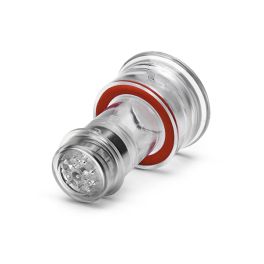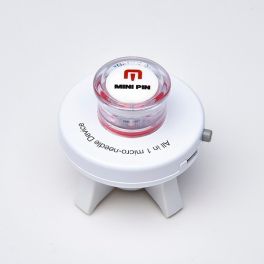Let's Discuss Dehydrated Skin Posted on 22 Jun 2022
UNDERSTANDING DEHYDRATED SKIN
While Dry skin and dehydrated skin can share many of the same characteristics, such as tightness, roughness, flaking, scaling, redness and sensitivity, they are quite different skin concerns.
Dry skin generally refers to skin lacking in oil, whereas Dehydrated skin is skin lacking in moisture - it is not so much a skin type as a skin condition.
Even oily and combination skin can be dehydrated. Dehydrated skin occurs when the protective uppermost layer of the skin, known as the stratum corneum, is lacking in moisture.
Some of the signs of dehydrated skin to look out for are itchy skin, dullness, dark circles under the eyes and the increased appearance of wrinkles.
Dry, dehydrated, rough and uncomfortable complexions can be caused by more than just your skin lacking in water, it can be caused from Diet, lifestyle , incorrect skincare products or the wrong make up being used.
All of these factors have been shown to strip skin of its protective barrier* and Natural Moisturising Factors (NMFs)*.
If the skin continues to be dehydrated , Then it is in for an uncomfortable time, with tightness, flaking, dullness and uneven skin tone all on the cards.
Fortunately, there are a few key ingredients that you can include in your skin care regimen to return your skin to its natural healthy norm.
These ingredients are five of the best vitamins and nutrients for Dry & Dehydrated skin. Omega fatty acids, ceramides, hyaluronic acid & Vitamin A are your skincare Key ingredients to repair.
OMEGA'S
Omega-3 and other fatty acids are dry/ dehydrated skin’s luminous best friend. These ingredients act as an internal moisturiser for skin, helping to ease the uncomfortable tightness and dryness that so often appears when the seasons change.
Research suggests that in addition to its hydrating skin benefits, fish oils can soothe inflammation and improve the skin’s barrier function** – which helps to keep moisture locked within the skin.
While omegas and fatty acids are sometimes found in topical creams, they’re particularly useful when they are ingested. Omegas are found in foods such as avocados, nuts, seeds and oily fish (mackerel, salmon and sardines)
At the Advanced Nutrition Programme, Skin Omegas+ is one of our hero skin supplements. Containing omega-3 from sustainable fish oil sources and omega 6 from evening primrose oil, plus vitamin A for added skin support to nourish dry skin and support a return to a youthful glow.
CERAMIDES


Troubles with the skin barrier is one of the main reasons our skin can suffer with dehydration.
If the Natural Moisturising Factors (NMFs) are depleted in the skin the skin can feel dry dehydrated and uncomfortable. These are the substances in the skin that typically help keep it healthy, hydrated and protected.
Ceramides can help to ease this, working to protect and strengthen the skin’s barrier function.
As a crucial fat that makes up much of the skin’s top barrier layers, ceramides have an important protecting function for the skin.
Healthy ceramide levels help to strengthen the skin’s barrier, meaning it is it harder for water and oil to escape which keeps the skin protected and moisturised from within.
Having a healthy skin barrier can also help reduce Trans-Epidermal Water Loss (TEWL): how much water is lost through the skin.
SkinCeuticals Triple Lipid Restore 2:4:2
Anti-aging lightweight cream formulated with a maximized concentration of lipids: 2% pure ceramides, 4% natural cholesterol, and 2% fatty acids. Clinically proven to improve the visible appearance of skin smoothness, laxity, pores, and overall radiance.

Hyaluronic Acid
When it comes to ingredients to restore and replenish moisture – hyaluronic acid is a much-hyped hydrating hero. With one molecule of hyaluronic acid capable of holding 1000 times its weight in water, the substance is a powerful thirst-quenching ingredient for dehydrated skin.
Hyaluronic acid is naturally found in the body, and in the skin it helps to plump out the gaps between cells. The amount of hyaluronic acid we produce drops as we age, so adding the molecule back into the skin is a recipe for radiant, hydrated skin. Thanks to the volume and moisture it restores to skin, not only is hyaluronic acid a hydrating hero, but it also has impressive skin anti-aging benefits. What’s not to like?

Dr. Barbara Sturm Hyaluronic Serum
Known as a popular ingredient in serums, creams and masks, hyaluronic acid may be equally, if not more potent, if included in the diet.
Trials have shown that hydration and luminosity levels both improve with the use of a hyaluronic acid supplement.

VITAMIN A
Alongside ingredients to moisturise and hydrate dry skin, vitamins and nutrients that support overall skin health are an essential part of every skin care routine.
Vitamin A is one nutrient that can make a huge impact on dry/ dehydrated skin.
You will be familiar with vitamin A in its topical anti-aging derivative, which is beloved for its youth boosting properties.
But it can also be taken as a supplement, & vitamin A is a vital ingredient for skin health as is has powerful skin renewal properties.
Dry skin and dead skin, can give a flaky, rough complexion, but vitamin A can help cell renewal to reveal healthy skin underneath.
The vitamin encourages skin cells to replenish and rejuvenate, so dry skin and dead skin cells are renewed, leaving a healthier complexion in their wake.




























